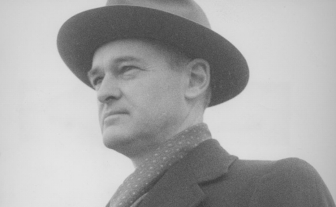In his recent article in Foreign Affairs, the American academic Alexander Motyl called on Western governments to review George F. Kennan’s case for the “containment” of the Soviet Union during the Cold War. Specifically, Motyl contends that Kennan’s containment strategy represents an “adequate policy response to Russian President Vladimir Putin’s ongoing aggression in Ukraine.”
The trouble with that argument is that if Kennan were alive today, he would most certainly disagree with such an interpretation of his work. In fact, he would likely see the present-day evocation of his Cold War strategy as yet another perversion of his original intent (to note, Kennan also did not intend “containment” to mean a military buildup as it was interpreted in Washington during the outset of the Cold War).
In the late 1990s, the US broke its unwritten promise to Russia, as the legal successor of the Soviet Union, not to expand NATO “one inch” beyond East Germany. Instead, Washington supported the admission of Poland, the Czech Republic, and Hungary into NATO. A realist, Kennan strongly opposed that move as a major error of US foreign policy, and emphasized that its consequences would be dangerous and would not lead to anything good.
However, his advice was ignored by the US political elite, which sought to expand NATO not only into the former Warsaw Pact states and the ex-Soviet Baltic republics, but also into Ukraine and Georgia. Kennan did not live long enough to see the disastrous 2008 South Ossetia war in Georgia, though if he had, he would have likely seen it as a vindication of his earlier warnings against the dangerous policy of NATO expansion. He would likewise view the current crisis in Ukraine as further proof of this.
On a more fundamental level, Kennan was also highly critical of the US policy of “democracy promotion” in the ex-Soviet space. Even during the depths of the Cold War, he believed that if communism ever did fall in Russia, Washington “should let Russians be Russians” and allow democracy to develop in Russia and the former USSR endogenously as opposed to getting involved. Once again, Kennan’s advice was ignored. After the collapse of the Soviet Union, American economists actively assisted the wild “shock therapy” privatization in Russia, while Washington gave then-president Yeltsin its full, unconditional support.
Thus, if the West is serious about formulating a solid Russia policy and about resolving the crisis in Ukraine, it needs to get Kennan right by looking beyond the discourse of containment and exploring his other foreign policy positions. Adhering to his advice would be the first step toward serious de-escalation.

